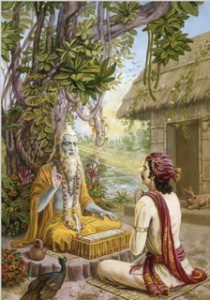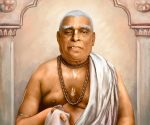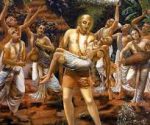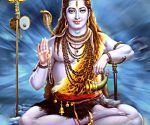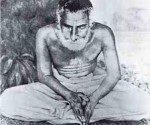Hear The Discourses Given By Self-Realized Souls
April 14, 2013 (VNN) – by Srila A.C. Bhaktivedanta Swami Prabhupada via Raja Vidya Newsletter
jivan chavo bhagavatanghri-renum
na jatu martyo ‘bhilabheta yas tu
sri-visnu-padya manujas tulasyah
svasan chavo yas tu na veda gandham
Translation: The person who has not at any time received the dust of the feet of the Lord’s pure devotee upon his head is certainly a dead body. And the person who has never experienced the aroma of the tulasi leaves from the lotus feet of the Lord is also a dead body, although breathing.
Prabhupada: So… Prahlada Maharaja was asked by his father, How did you develop this Krsna consciousness? So he replied that naisam matis tavad urukramanghrim: This Krsna consciousness cannot be developed. . . Sprsaty anarrthapagamo yad-arthah. Krsna consciousness, dvelopment of Krsna consciousness, means anartha apgama. Anartha means things we do not require. Anartha, Artha, anartha. Artha means which is essentially required, and anartha means which is not required, artificially we have requisitioned. So when one grows his Krsna consciousness, immediately his artificial life bcomes finished. Bhaktih paresanubhavo viraktir anyatra syat. This is the symptom of development of Krsna consciousness, that he’s not anymore interested for material, unnecessary things. This is the test. If one is increasing Krsna consciousness, at the same time he has got full attachment for material things, that means he’s not developing. Material things means ahara-nidra-bhaya-maithunam ca.
Eating, sleeping, mating and defending. So sometimes the karmis are afarid of this Krsna consciousness movement because they know that as soon as one becomes Krsna conscious, he is no more interested in these material things. Just like we say Don’t eat meat. So actually, if all people become Krsna conscious and give up meat-eating, then the slaughterhouse will be closed. Automatically. We say no meat-eating and no intoxication. So if all people become Krsna conscious and give up drinking and smoking, the big buisness, breweries and cigarette manufacturers, will be closed. Similarly, no illicit sex. If people take to Krsna consciusness, then so many brothels and clubs and nudies and everything wil be closed. So they are afraid of their business; therefore they don’t encourage this movement. Because ultimately, if this movement goes on, then where they stand? Everywhere we go, the advertisement is for intoxication, for sex, and for meat-eating. These are the advertisments.
Business is going on very nicely. But Krsna consciousness means viraktir anyatra syat. If one takes the dust of the lotus feet of a pure devotee, immediately he becomes free from all these unneessary demands.
naisam matis tavad urukramanghrim
sprsaty anarthapagamo yad-arthah
mahiyasam pada-rajo-bhisekham
niskincananam na vrnita yavat
Krsna consciousness cannot be developed unless one takes the dust of the lotus feet of a pure devotee. This is these words, Prahlada Maharaja’s remarks. In other words unless one comes in contact with a pure devotee, Krsna consciousness cannot be developed. It is not possible. Therefore here it is recommended by Suta Gosvami that jivan chavo bhagavatanghri-renum na jatu martyo Ôbhilabheta yas tu. Renu, renu means dust. If one does not try to secure the dust of the lotus feet of bhagavata… Bhagavata means pure devotee of the Lord.
One Bhagavata is this book bhagavata, another bhagavta, the person bhagavata. Who lives on the book bhagavata, he is person bhagavata. Two kinds of bhagavata. So we have to learn Bhagavatam from the livingbhagavata. Caitanya Mahaprabhu’s secretary, Savrupa Damodara, he advised one brahmana. One brahmana wrote something about Lord Caitanya Mahaprabhu. There were many poets and writers used to come and visit Caitanya Mahaprabhu when He was at Jagannatha Puri, and they would present some writings, but these writings would not be presented before Caitanya Mahaprabhu unlesss it was sanctioned by His secretary Svarupa Damodara. That was the system. So one brahmana, he wrote one poetry that… the purport of the poetry was that Jagannatha is Krsna. But He cannot move. He’s wooden Krsna. And Caitanya Mahaprabhu is also Krsna, but He is moving Krsna. That means he distinguished between Jagannatha and Caitanya Mahaprabhu. So this is not siddhanta.
This is not conclusion of the sastra. Sastra conclusion is: the Deity and Krsna, the same. There is no difference. We have many times explained this. Deity, the worshipful Deity in the temple, is not different from Krsna. So Svarupa Damodara did not approve of the poetry to be presented to Sri Caitanya Mahaprabhu. At that time, he chastised him that You do not know the conclusion, and you dare to write some poetry. Don’t do this. And he said, bhagavata para giya bhagavata-sthane(?) If you want to understand Srimad-Bhagavatam, then you go and study Srimad-Bhagavatam from the pure devotee. Then you’ll understand. Otherwise you’ll write all these nonsense.Bhagavata para giya bhagavata-sthane. So one bhagavata. . .The two bhagavatas. You study Srimad Bhagavatam from living bhagavata. So if one does not take or does not surrender unto the living bhagavata he cannot understand Srimad-Bhagavatam. Many scholarly, learned scholars, Sanskrit scholars, they cannot understand Bhagavatam.
I have seen many scholars, they canot understand Bhagavata. Sanskrit scholars, they will read but they will not be able to understand. Similarly Bhagavad-gita also. If anyone studiesBhagavad-gita from scholarly point of view, a-b-c-d, he’ll not understand. Krsna therefore says that Arjuna, I shall speak the lessons of Bhagavata unto you because you are My very dear friend and you are My devotee. Krsna didi not want to speak Srimad-Bhagavad-gita toa scholarly student. No, these books are not to be understood by mundane scholarship. That is not possible.
All the Vedic sastras, all the Vedic sastras. There is a big commentary on Bhagavad-gita by a great scholar and political leader, Lokamangal Tilak. So one of his devotees, he’s also politician. When I was in London in 1968. . . So he has got a society there. They’re preaching the Tilak’s political view, like that He has got a. . .So he came to seeme, and he was very much eulogising Lokamangal Tilak, that he has written his big comentary, Karma-yoga.
So he wanted to invite me in talk on Tilak’s great task. So I told him that Tilak does not understand Bhagavad-gita. So immediately he was surprised. Then we had a talk, and I convinced him that Tilak was a politician, maybe a big scholar, but that does not mean he can understand Bhagavad-gita. Bhagavata-gita is understood by devotee. He may be illiterate. It doesn’t matter. Still. . .As Caitanya Mahaprabhu certified the illiterate brahmana who was reading Bhagavad-gita in Ranganatha temple. . .You know the story. Thebrahmana was illiterate. His guru ordered him that You read Bhagavad-gita daily, eighteen chapters. So he could not refuse the order of guru maharaja; so he was taking the book and simply seeing. So those who knew that he was illiterate, they were criticising, Well, brahmana, how you are reading Bhagavad-gita? He could not answer because he knew that I am illiterate, I do not know. Caitanya Mahaprabhu saw this fun and approached him. Well, brahmana, what you are reading?
So he could understand that this Caitanya Mahaprabhu has not come to criticize him; He’s serious. So he informed Him, Sir, I am reading Bhagavad-gita, but I am illiterate. I am illiterate but my spiritual master has ordered to read. What can I do? I have taken this book and moving these pages. That’s all. What can I do? Actually I cannot read. Then Caitanya Mahaprabhu inquired, But I see you are sometimes crying. Yes, sir, I sometimes cry. Why? Now, because as soon as I take this book in my hand and I see the picture that Lod Krsna is driving the chariot of Arjuna, I cry. Oh Krsna is so kind that He has taken the service of His devotee. He should have been seated on the chariot–Arjuna should have driven the chariotÑbut He’s driving the chariot and Arjuna is sitting on the seat. So Krsna is so kind and beloved that He can serve His devotee. It is the duty of the devotee to serve Him, but He’s so kind and affectionate that He serves His devotee.’ So as soon as I think of this – Krsna’s magnanimity – I cry.
Then immediately, Caitanya Mahaprabhu embraced him, that “You are… Your reading of Bhagavad-gita is perfect. Because you have understood the essence of the Bhagavad-gita.” The scholars, they will say… When Krsna says, man-mana bhava mad-bhakto mad-yaji mam namaskuru [Bg. 18.65], the scholars will say, “It is not to Krsna the person, it is to the impersonal Brahman which is within Krsna.” They cannot conceive that the Supreme Absolute Truth can become a person. They cannot conceive. Such a huge cosmic manifestation is created by a person like us, resembling like us, two hands, two legs-their poor brain cannot accommodate. Param bhavam ajanantah. Avajananti mam mudha manusim tanum asritam[Bg. 9.11]. That is stated in Bhagavad-gita. Mudhah. “Fools and rascals,” avajananti, “deride at Me, thinking Me as ordinary man.” Param bhavam ajanantah, “He does not know what is the transcendental potency behind Me.”
Param bhavam ajanantah. So the Mayavadis and poor fund of knowledge, they cannot understand Krsna unless he becomes a devotee. And how he can become a devotee? That is stated here: bhagavatanghri-renum. One has to surrender himself to His representative, bhagavata. Bhagavata means… God is called Bhagavan. Bhagavat, the original word is bhagavat, and one who has got intimate relation with Bhagavan, he is called bhagavata. So here it is recommended, bhagavatanghri-renum na jatu martyah. Martya means one who will die. Every one of us will die. But abhilabheta yas tu. But we can achieve a great success. Although this body’s mortal, we can get, we can achieve a great success. And what is that? To take the dust of the lotus feet of a bhagavata. Simple thing. Therefore it is said, jivan chavah. Jivan chavo bhagavatanghri-renum na jatu martyo ‘bhilabheta yas tu. After all, this body is dead. Everyone knows. It is simply moving on account of the presence of the spirit soul.
As soon as the spirit soul is out of this body, out of this bag of flesh and bone … We are so much attached to this bag of flesh and bones, but those who are learned, they know that this body is nothing but flesh and bones. The real person, the real force, is the soul. Yasyatma-buddhih kunape tri-dhatuke [SB 10.84.13]. A bag of bones and fleshes. This is not our identification. I am not this body. Do you think if you take some bones and flesh and accumulate them and bundle them, will they produce any intelligence? If I am this body, then this body means a bundle of flesh and bones. So the flesh and bones can be had outside. The scientists can take them and bind them together and then see that it is coming, a scientist, another scientist, Professor Einstein is coming from the bones and flesh. Is it possible? It is not possible. The bones and flesh are bones and flesh. The real identity is the soul. According to his karma, he manifests his intelligence. Although this intelligence is coming out through his bones and flesh.
Just like I am seeing through this glass. That does not mean the glass is seeing. The seeing power is different from the glass. Similarly, those who are thinking that they are this body, under bodily concept of life…
yasyatma-buddhih kunape tri-dhatuke
sva-dhih kalatradisu bhauma ijya-dhih
yat-tirtha-buddhih salile na karhicij
janesv abhijnesu sa eva go-kharah
[SB 10.84.13]
Bhagavata says, “One who accepts this body as the self, he is no better then the cow and the ass.” Foolish animal. I have several times explained why ass is called foolish, why cow is also foolish. Simple. Cow is simple; cow is… So they are compared with animals, one who accepts… Therefore this body continues to be animal body or a dead body unless in the human form of life one takes advantage of touching the dust of the lotus feet of a devotee. Jivan chavo bhagavatanghri-renum na jatu martyo ‘bhilabheta yas tu…(aside:) She is sleeping. Sri-visnu-padya manujas tulasyah svasan chavo yas tu na veda gandham.
The nostrils… We smell. So our Krsna consciousness smelling means we should offer all nice flowers and tulasi on the lotus feet of the Lord. And we shall accept prasadam. The priest will offer, and if we smell that, then our smelling power is fulfilled. That means… These Kumaras, catuhsana Kumaras, Sanaka-kumaradi, they were first of all impersonalists, but after smelling thetulasi leaves which were offered to the lotus feet of Visnu, they become personalists. So this is an opportunity. If anyone comes, smells the flowers and the tulasi offered to Visnu, tastes the visnu-prasada, and sees the Lord’s form, in this way he develops Krsna consciousness. So this is opportunity. This temple means an opportunity, a process, a simple process. Not simple for ordinary man, but actually it is simple. Anyone can smell the flowers offered to Krsna. Anyone can eat the foodstuffs offered to Krsna. Anyone can see the Deity so nicely decorated. Anyone can hear Hare Krsna mantra.
So we have got these senses. So if we engage our senses in this way-our seeing power, our hearing power, our talking power, our smelling power, our touching power, our tasting power-in this way, if we engage everything in connection with Krsna, very easily we become Krsna conscious. And as soon as we become Krsna conscious, then our life is successful. We become liberated from this bondage of birth and death. So this is the process. Now read.
Pradyumna: “According to Srila Visvanatha Cakravarti Thakura, the breathing dead body is a ghost. When a man dies, he is called dead, but when he again appears in a subtle form not visible to the present vision and yet acts, such a dead body is called a ghost. Ghosts are always very bad elements, always creating a fearful situation for others. Similarly, the ghostlike nondevotees who have no respect for the pure devotees, nor for the Visnu Deity in the temples, create a fearful situation for the devotees at all times. The Lord never accepts any offering by such impure ghosts.
There is a common saying that one should first love the dog of the beloved before one shows any loving sentiments for the beloved. The stage of pure devotion is attained by sincerely serving a pure devotee of the Lord. The first condition of devotional service to the Lord is therefore to be a servant of a pure devotee, and this condition is fulfilled by the statement “reception of the dust of the lotus feet of a pure devotee who has also served another pure devotee.” That is the way of pure disciplic succession, or devotional parampara.
Maharaja Rahugana inquired from the great saint Jada Bharata as to how he had attained such a liberated stage of a paramahamsa, and in answer the great saint replied as follows (Bhag. 5.12.12):
rahuganaitat tapasa na yati
na cejyaya nirvapanad grhad va
na cchandasa naiva jalagni-suryair
vina mahat-pada-rajo-‘bhisekam
“O King Rahugana, the perfectional stage of devotional service, or the paramahamsa stage of life, cannot be attained unless one is blessed by the dust of the feet of great devotees. It is never attained by tapasya [austerity], the Vedic worshiping process, acceptance of the renounced order of life, the discharge of the duties of household life, the chanting of the Vedic hymns, or the performance of penances in the hot sun, within cold water or before the blazing fire.”
In other words, Lord Sri Krsna is the property of His pure unconditional devotees, and as such only the devotees can deliver Krsna to another devotee; Krsna is never obtainable directly. Lord Caitanya therefore designated Himself as gopi-bhartuh pada-kamalayor dasa-dasanudasah, or “the most obedient servant of the servants of the Lord, who maintains the gopi damsels at Vrndavana.” A pure devotee therefore never approaches the Lord directly, but tries to please the servant of the Lord’s servants, and thus the Lord becomes pleased, and only then can the devotee relish the taste of the tulasi leaves stuck to His lotus feet. In the Brahma-samhita it is said that the Lord is never to be found by becoming a great scholar of the Vedic literatures, but He is very easily approachable through His pure devotee. In Vrndavana all the pure devotees pray for the mercy of Srimati Radharani, the pleasure potency of Lord Krsna. Srimati Radharani is a tender-hearted feminine counterpart of the supreme whole, resembling the perfectional stage of the worldly feminine nature. Therefore, the mercy of Radharani is available very readily to the sincere devotees, and once She recommends such a devotee to Lord Krsna, the Lord at once accepts the devotee’s admittance into His association. The conclusion is, therefore, that one should be more serious about seeking the mercy of the devotee than that of the Lord directly, and by one’s doing so (by the good will of the devotee) the natural attraction for the service of the Lord will be revived.”
Prabhupada: All right, chant Hare Krsna. (end)




